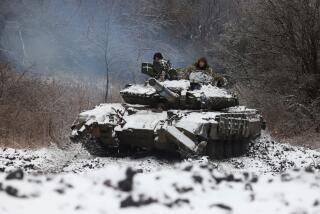U.S. Says Moscow Broke Afghan Accord : Calls Air Attacks by Soviet-Based Planes Violation of Geneva Pact
- Share via
WASHINGTON — The Reagan Administration on Tuesday accused the Soviet Union of violating the Geneva agreement on Afghanistan by using warplanes based in Soviet territory to bomb positions held by Muslim guerrillas in the northern Afghan city of Kunduz.
State Department spokeswoman Phyllis Oakley said Washington reported the breach to the U.N. team that is overseeing the Soviet withdrawal from Afghanistan.
Soviet forces evacuated Kunduz two weeks ago as part of Moscow’s agreement to remove half of its estimated 115,000 troops by Aug. 15. The moujahedeen rebels captured the city shortly after the Soviets left.
The Soviets sent artillery and other combat units from elsewhere in Afghanistan to support the Afghan army’s drive to recapture the city, Oakley said.
She said deployment of the ground troops did not violate the accords because those forces already were in the country, but she added that the use of air power from outside Afghanistan did constitute a violation. Washington still expects the Soviets to abide by their promise to complete the evacuation by Feb. 15, she said.
The April 14 Geneva accords, in addition to providing for withdrawal of Soviet troops, state that the two superpowers agree to refrain from interference or intervention in the internal affairs of Afghanistan.
By engaging in combat to support its Afghan-government client, Moscow seemed to be sending a message that it will react to moujahedeen attempts to capitalize on the Soviet withdrawal. However, if the Soviets continue pulling back their ground troops on schedule, they soon will reach a point where they may be unable to control the military situation in Afghanistan.
Warning to Moscow
Washington’s protest of the use of Soviet-based aircraft in Kunduz was intended as a warning against an attempt by Moscow to bolster the Afghan army with air power once the withdrawal of Soviet ground forces is complete. However, even if the Soviets did continue bombing missions, they might find it difficult to prevent the collapse of the Afghan army without sending Soviet ground forces back in. The United States learned both in Korea and Vietnam that air power, without the support of ground troops, is ineffective against a determined opponent.
“The fighting is continuous around Kunduz, and the regime is sending five flights a day to the city to resupply its troops with food and ammunition,” Oakley said.
“We understand that these (Soviet) forces remain in place in Kunduz, with emphasis on the use of artillery to dislodge the moujahedeen, rather than the commitment of Soviet infantry to the battle,” she said. “It is clear that aerial bombardment has been an element of the regime’s efforts to retake Kunduz.”
“The use of the Soviet aircraft coming from inside the Soviet Union is a violation of the Geneva accords,” she added. “We have raised the issue of Soviet compliance with UNGOMAP (the U.N. Good Offices Mission in Afghanistan and Pakistan).”
The U.N. office has no real enforcement power, and the Soviets have protested repeatedly to the office that Pakistan has violated the accord by continuing to funnel U.S. military aid to the moujahedeen. However, Moscow has not accused Washington of direct violations of the pact, signed last April by Afghanistan and Pakistan, with separate guarantees signed by the Soviet Union and the United States.
Oakley said the issue would be raised when Undersecretary of State Michael H. Armacost meets Soviet First Deputy Foreign Minister Yuli M. Vorontsov on Thursday and Friday in Moscow.
More to Read
Sign up for Essential California
The most important California stories and recommendations in your inbox every morning.
You may occasionally receive promotional content from the Los Angeles Times.













